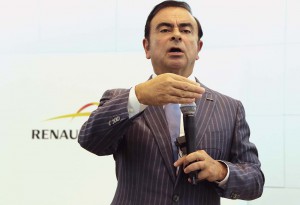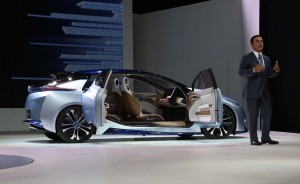The 16-year-old alliance between Japan’s Nissan and France’s Renault isn’t about to break down, Carlos Ghosn, who serves as CEO of both companies, said during an appearance at the Tokyo Motor Show.
Widely considered the most successful relationship of its kind in the auto industry, questions have been raised by reports that the French government wants to raise its stake in Renault, something that could shift the power balance of the alliance. Some observers now expect Nissan – which holds no voting rights in its ally – to step in and purchase a stake in Renault.
While Ghosn declined to address specifics, he stressed that he doesn’t see the Renault-Nissan Alliance breaking down. “From time to time you are going to have crisis, problems, divergence,” he said during his news conference, but the two companies are “aligned on the fact that the alliance has been a tremendous success.”
And, if anything, he added, it has become a role model for an industry that is facing increasing challenges likely to see even more consolidation. There, Ghosn is far from alone in seeing the need to reduce the number of global players – or at least have “cooperation between companies that our (otherwise) competing against each other.”
That’s a theme frequently sounded, of late, by Sergio Marchionne, the CEO of Fiat Chrysler Automobiles. However, where Marchionne has been rebuffed in his efforts to share product development costs and improve production plant economies of scale, Ghosn has knit together what is now an effective three-partner alliance, with Germany’s Daimler AG participating in a number of key projects – including a new, jointly run assembly line in Mexico.
The situation is all but certain to force even more consolidation, Ghosn responded to a question from TheDetroitBureau.com. He noted that even with the current, booming recovery in the U.S. market, global sales are effectively flat this year, and likely to see perhaps 2% growth, at best, in 2016.
“And we don’t see much more after that,” he lamented.
Even so, there are new players entering the market, such as Tesla and, perhaps Google and Apple. And a number of Chinese makers want to break out of their local market to take a share of global sales.
Another factor is the transformation of the automobile into a rolling piece of technology, said Ghosn, noting “You cannot bypass any of that technology anymore, which means you require a lot more resources” to keep up.
(Nissan introduces autonomous IDS concept at Tokyo Motor Show. For more, Click Here.)
That bodes particularly well for some of the well-funded technology players, such as Google and Apple, who appear to be eyeing the automotive market.
But even while Ghosn insisted, “All this means the industry will have to consolidate more,” he quickly reminded his audience there are “very few cases where you can say there have been clear, positive partnerships.”
Just ask Sergio Marchionne, who had to step in and, at the help of Fiat, rescue a Chrysler bankrupted after the collapse of its “merger of equals” with Daimler. Ironically, Ghosn has crafted a more effective, if more limited, relationship with the German maker.
(Navigating Tokyo in Nissan’s autonomous Leaf. Click Here to see more.)
During a wide-ranging discussion with the media, Ghosn explained Nissan’s strategy for autonomous driving, a potentially game-changing technology. The Japanese maker aims to have a fully self-driving vehicle – one capable of operating not only on limited-access highways, but also city streets – by 2020.
“Our objective in autonomous driving doesn’t take the driver out of the car,” he said. “It empowers you,” by allowing a human to choose whether to hand over driving duties or simply use the vehicle’s technology to assist.
(Click Here for details about why gas prices continue to slide in the U.S.)
That, Ghosn said, should “make your life onboard easier and more pleasant,” and help significantly reduce vehicle accidents, injuries and fatalities. But while he stressed the potential benefits, the Brazilian-born exec admitted it is far too early to know how car buyers of the near future will respond once autonomous vehicles begin to roll out onto the marketplace.


